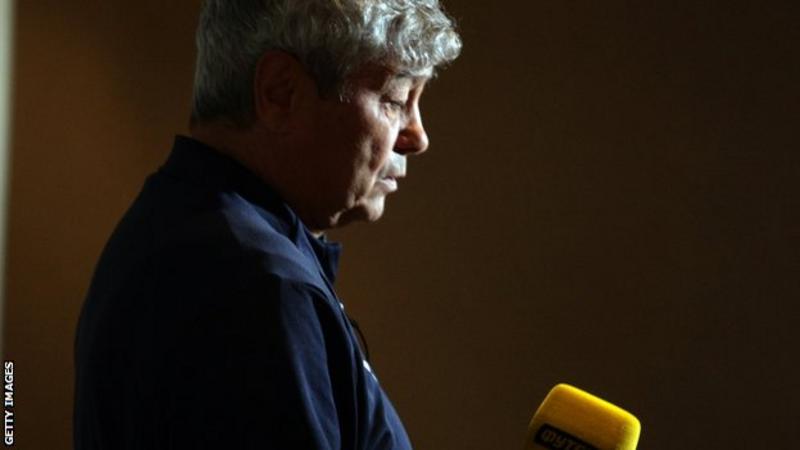 Imagine Sir Alex Ferguson taking over at Liverpool. Sounds impossible? That is roughly the scenario that unfolded in Ukraine this summer, when Dynamo Kyiv decided to gamble on Mircea Lucescu, the ultimate symbol of their fiercest rivals, Shakhtar Donetsk.
Imagine Sir Alex Ferguson taking over at Liverpool. Sounds impossible? That is roughly the scenario that unfolded in Ukraine this summer, when Dynamo Kyiv decided to gamble on Mircea Lucescu, the ultimate symbol of their fiercest rivals, Shakhtar Donetsk.Both sets of fans could hardly believe their eyes when the official appointment was made on 23 July. It is difficult to say which was was the more furious.
For the Shakhtar faithful, Lucescu's move felt like a betrayal, but the Kyiv ultras refused to accept the new coach too.
Their statement couldn't have been more blunt: "We wanted to believe this was a silly hoax, but it turns out the club management has lost all remaining common sense, honour and self-respect. They spit into the faces of Dynamo fans and must fully understand the consequences."
Why is Lucescu seen as such an enemy? Because that is exactly how he positioned himself, in more ways than one, during a 12-year spell at Shakhtar that ended in 2016. His mission had been to knock Dynamo off their perch, and it was accomplished in emphatic fashion.
The history between the clubs goes back to Soviet times, when Dynamo were the ultimate force in Ukrainian football. Most of the Soviet Union's republics had one club that was basically a sort of 'national team' - Dinamo Tbilisi in Georgia, Ararat Yerevan in Armenia, Neftchi Baku in Azerbaijan, Dinamo Minsk in Belarus. Ukraine had several clubs in the top division, but Kyiv could still take any local player they liked. They had the support of the authorities, and that is what mattered.
This was especially true in the legendary Valery Lobanovsky's times. Take 1986, for example. Dynamo won the Cup Winners' Cup that year, and immediately afterwards Lobanovsky included no fewer than 12 Kyiv players in his World Cup squad (he was also co-managing the Soviet Union).
Only two Ukrainians who represented the Soviets at that tournament played for another club: Oleg Protasov and Gennady Litovchenko of Dnipro Dnipropetrovsk. However, both were lured to Kyiv in a hugely controversial 1988 transfer that once again proved Lobanovsky could have any player he wanted.
Ukraine's other clubs had to live in Kyiv's shadow - this single all-conquering giant. After the Soviet empire fell, Dynamo continued to dominate the local scene. They won 11 championships between 1993 and 2004, and at times enjoyed successful runs in the Champions League as well.
One man was eager to stop that. Rinat Akhmetov, the richest businessman in the country, became Shakhtar Donetsk president in 1996 and made huge investments in order to turn them into a superpower. The Miners were never close to the top in the Soviet era, and Dynamo didn't see them as a threat - until they became exactly that.
It took time, but a key move was appointing Lucescu as coach in 2004.
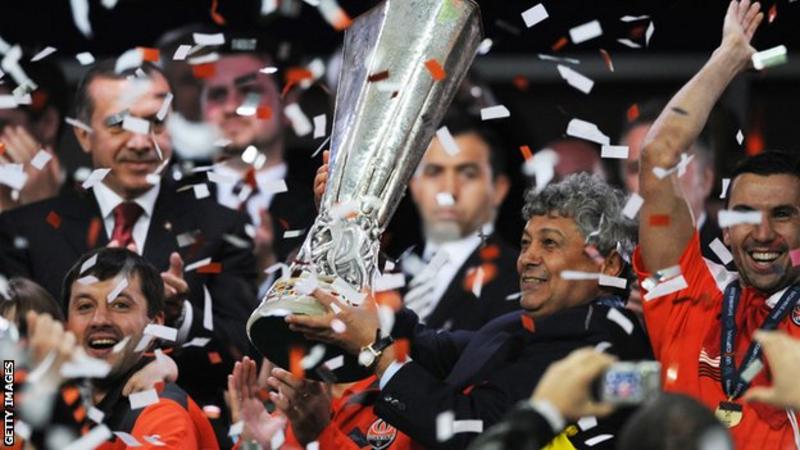
Akhmetov had tried to bring the Romanian to Donetsk earlier. Lucescu, who began his coaching career in 1979 in his home country, had by this point worked at several clubs in Italy and Turkey, including Inter Milan and Galatasaray.
Shakhtar were fully rewarded for their persistence. Lucescu won them the league title at the first attempt. In his first 10 years with the club, Shakhtar were champions eight times, Uefa Cup winners in 2009 and domestic cup winners five times. He made some revolutionary changes as well.
Whereas Dynamo Kyiv's style was historically based on speed and physical fitness, Lucescu's Shakhtar chose to rival them by playing a neat short-passing game. Countless Brazilian stars were unearthed by a magnificent scouting network supervised by Lucescu, and Dynamo were left behind.
Shakhtar were the present and the future. For Kyiv supporters, who suddenly became underdogs, that was a very bitter pill to swallow.
Lucescu wasn't a delicate or gentle winner either. He fought Dynamo relentlessly and wholeheartedly, criticised them in the press at every opportunity and appeared to love the media attention it brought. The Romanian constantly claimed that Kyiv would receive preferential treatment, and tried to picture Shakhtar as the good guys up against evil forces. He presented his triumphs as victories against all odds.
The political angle is also mightily important.
Shakhtar were the most important club from eastern Ukraine, a part of the country with much closer ties to Russia historically. On the club's official website, for example, Russian is the default language, rather than Ukrainian.
Tension between the regions was always significant, but it became unbearable after the events of 2014.
That year, an uprising against Ukraine's pro-Russian president, Viktor Yanukovych, ushered in a Western-leaning government, but Russia used the opportunity to seize the Crimean peninsula and arm insurgent groups to occupy parts of the industrialised east of Ukraine.
Shakhtar were forced to abandon Donetsk and their modern stadium, but continue to represent their home city in exile. They now play in Kyiv.
Lucescu didn't hesitate to take sides, and he continued to do so even after leaving Shakhtar in the summer of 2016.
By that point a resurgent Dynamo had won two consecutive titles. Lucescu decided it was time to move on and joined Zenit St Petersburg, the club sponsored by Russia's state-owned energy giant Gazprom. For context, Ukraine's best defender Yaroslav Rakitsky was thrown out of the national team after moving from Shakhtar to Zenit in 2019.
"Acclimatisation wasn't difficult. Russia and Ukraine are the same country for me. They were split by accident, but for people of my generation they are both parts of the former Soviet Union," Lucescu said.
A lot of Shakhtar fans could identify with those words, but for supporters of Dynamo Kyiv they were unacceptable.
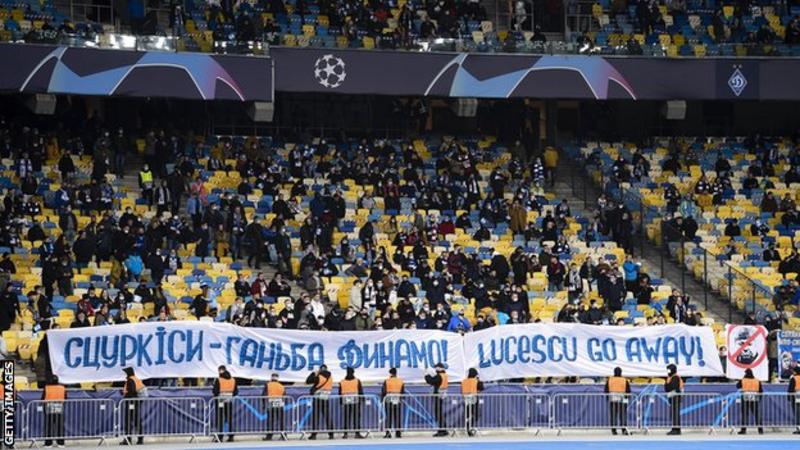
The affair at Zenit was much shorter than Lucescu expected, and he was fired after a disastrous single season full of endless squabbles with players, management, referees and journalists. He returned to Turkey, where he had won consecutive league titles at Galatasaray and Besiktas at the beginning of the century, but in his new job leading the national team was not a success. Lucescu failed in both the World Cup qualifiers and the Nations League, and left the role in February 2019.
At the age of 73, it seemed like the end of the road. Instead, Lucescu's long-time assistant and friend Alexandru Spiridon said: "Mircea will find another job. He might even come back to Ukraine."
Shakhtar supporters were quite excited to hear that, but the Romanian stated: "That wouldn't be the right thing to do. Shakhtar have a successful coach now [Paulo Fonseca, who moved to Roma in 2019]. I had a great spell in Donetsk and built the system that continues to work. There is no chance of me going back."
A year later, he would indeed return to Ukraine. Just not to Shakhtar.
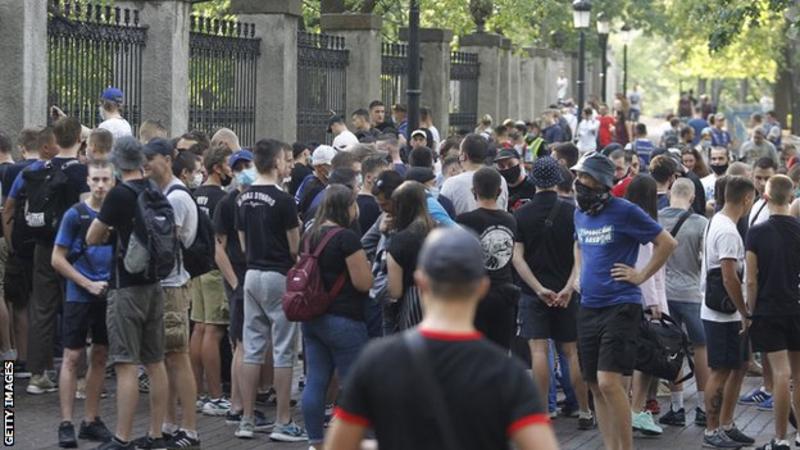
Shakhtar had won four titles in the years since Lucescu's departure, and Dynamo Kyiv had become desperate. Legendary former players Alyaksandr Khatskevich and Oleksiy Mikhaylichenko had failed as manager, and club owner Ihor Surkis decided to change direction completely. Lucescu was seen as a possible saviour, thanks to his prestige and experience.
"Surkis doesn't know European football very well," says Tribuna.com journalist Ilya Novikov. "He understood that coaches from the Dynamo system can't bring him success, but wouldn't consider someone like Slavia Prague coach Jindrich Trpisovsky because he doesn't feel comfortable with those options.
"Russian coaches were out of question because of the political situation. Lucescu was someone very familiar, with a great track record, and that was the reason behind his appointment."
The Dynamo ultras responded in a truly furious fashion. "Choosing a 74-year-old coach who regularly spoke against Dynamo is unacceptable," they wrote in a statement. "We ask all the Dynamo employees who still respect themselves to resign."
Their public protests were so powerful that it seemed to have created an unbearable pressure. Lucescu moved to cancel the whole deal just four days after signing, before even arriving in Ukraine.
Surkis refused to accept the resignation. He wrote a personal letter to Lucescu, convincing him to continue, stating: "The emotions of some fans can't become the deciding factor in the club's future."
And so Lucescu landed in Kyiv, ready to start the unthinkable adventure.
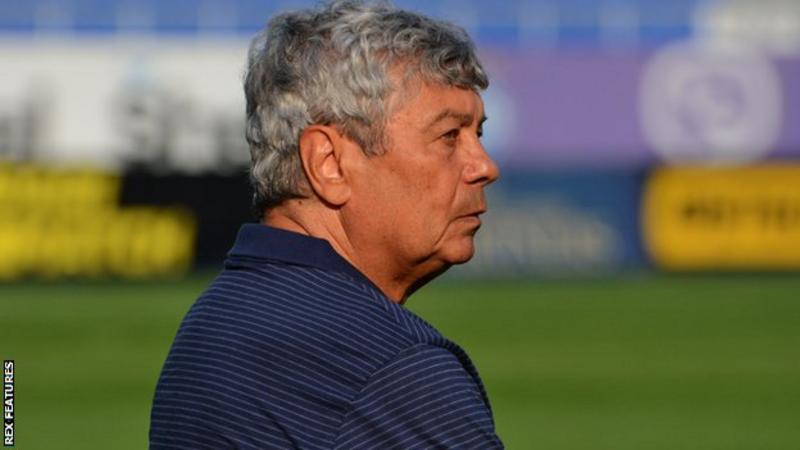
Just a year previously Lucescu had strongly criticised club legend Lobanovsky, who died in 2002. He claimed his place in France Football's rankings of greatest coaches was wrong. The Ukrainian was listed sixth, while Lucescu himself was "just" 41st.
"I am very surprised by Lobanovsky's placing," Lucescu said. "When he went out of his country, he achieved absolutely no results." It prompted rage from Dynamo fans.
Now he struck a very different tone. Upon landing in Kyiv, he hurried to bring flowers to Lobanovsky's statue and said: "I respect him very much." Curiously, the club tried make the visit as low-profile as possible - perhaps anticipating it would not be accepted as a sincere gesture by the ultras.
Their opposition certainly hasn't diminished. During Dynamo's first league match against Olimpik Donetsk, played behind closed doors in Kyiv, fans managed to storm into the ground, shouting obscenities at Surkis and his new coach during a 4-1 win.
Even a 3-1 victory in Lucescu's first significant test - over Shakhtar in Ukraine's Super Cup - did not quell the unrest. Protests against Lucescu continued every day.
"I don't care about the ultras. I only think about my players and their performances. As a professional, I don't show my feelings," Lucescu said.
His actions, perhaps, spoke louder than words. Lucescu chose to live at Dynamo's training ground in order to avoid any contact with fans, and the atmosphere around the team was far from normal. "It's a pity. We play for our fans, and want them to support us," young winger Heorhiy Tsitaishvili said.
Now, three months into the season, Lucescu's team face their next meeting with Shakhtar, a more meaningful league match-up that will help determine the course of the season.
"I know that my relations with Shakhtar fans have been quite damaged now, but I wanted to feel alive again. Football is my life, and I sat at home for a long year. I really missed football. I couldn't refuse such an offer," Lucescu said in an October interview with Tuttosport.
On Sunday, when his new side hosts his former club, he will definitely feel very much alive - and he is facing them from the top of the table.
Unbeaten, with six wins from their eight matches, Dynamo lead their rivals by four points. Shakhtar have also yet to lose this season, but they are wildly inconsistent and have drawn four times against lesser opposition. Victory for Kyiv would open a seven-point margin over their closest and only realistic challengers.
Dynamo will have taken confidence, too, from a respectable showing in Tuesday's 2-1 Champions League defeat at Barcelona. They have only one point from three matches in Europe, and Lucescu was heavily criticised for poor substitutions when Kyiv wasted a two-goal lead to draw 2-2 at Ferencvaros, but the performance in Spain was quite impressive.
In fact, Lucescu has already achieved success by reaching the group stage, as Dynamo were considered underdogs against AZ Alkmaar in the qualifiers before also overcoming Gent in the play-offs.
Shakhtar meanwhile, began their Champions League campaign in sensational fashion, beating Real Madrid 3-2 away and drawing at home with Inter Milan. But on Tuesday they were thrashed 6-0 by Borussia Monchengladbach. Hardly the best way to prepare for the most important game of their domestic campaign.
When asked about Shakhtar's heavy defeat, Lucescu stated: "I don't want to make comments, and I didn't watch that match at all. I don't discuss other teams. Talk to me about Dynamo."
He is making every effort to distance himself from his past, but it is impossible to do so in a country that remains deeply divided. Lucescu's role with his former foe still surprises, and there is a long way to go before he starts winning over hearts and minds.
In October he became the oldest coach in Champions League history, aged 75. He may well be the most hated, too.








